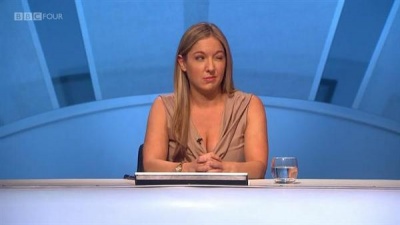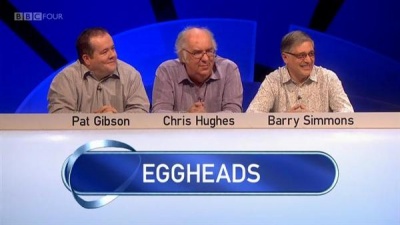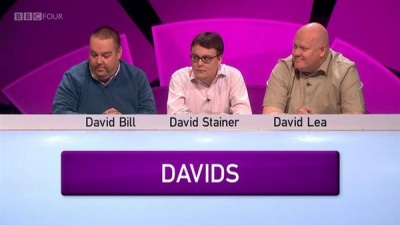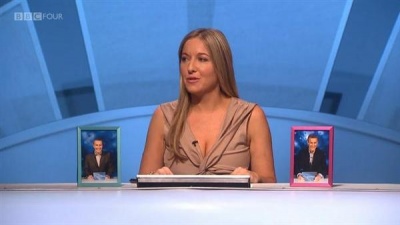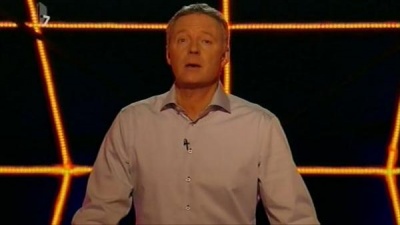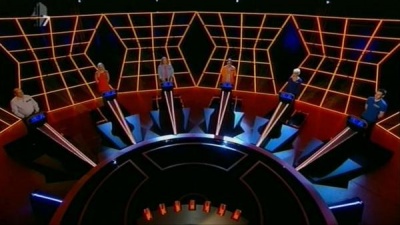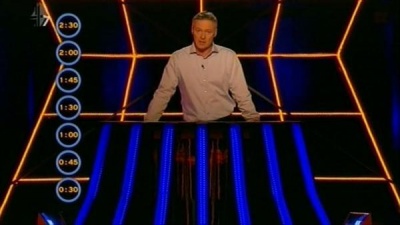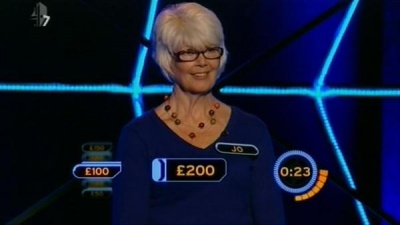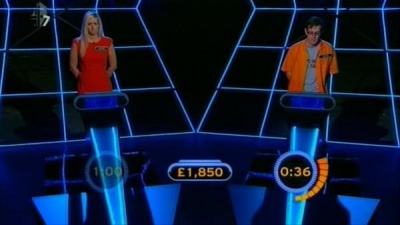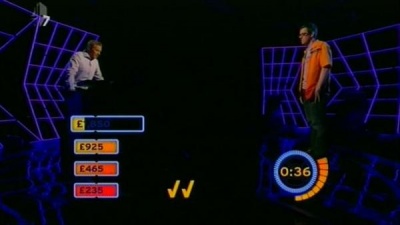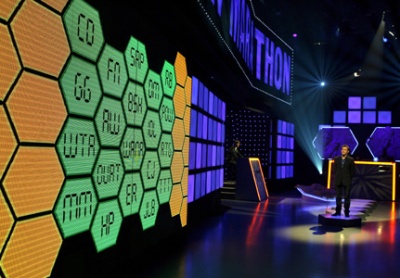Weaver's Week 2013-01-20
Last week | Weaver's Week Index | Next week
Coming up, Rory Bremner tries to do a Kenneth Kendall impression. Except he doesn't do impressions any more.
Contents |
Only Connect
Special: Eggheads v Davids
In this challenge match, the Eggheads are represented by Pat Gibson (Millionaire), Barry Simmons (Brain of Britain), and Chris Hughes (Quiz God). Chris thinks his side will claim a moral victory. Against these quiz Goliaths, a team of Davids: Mr. Bill (Gamblers), Mr. Lea (Analysts), and Mr. Stainer (Crossworders). Victoria is rooting for her home boys, but she's going to be impartial.
The Eggheads are batting, and have Jurors -3, Petals on Rememberance poppies -2, Premier League teams +8, then they buzz, then they confer, and then they don't know. Differences between England and Scotland is the right answer, as the Davids pick up for a bonus. On their own question, it's Coypu in Louisiana, the author of the Sasser worm, enlistees in the US civil war, and Sadaam Hussein. The Davids allow time to expire, the Eggheads have no idea. They all attracted bounties, apparently. Davids lead it 1-0.
Back with the Eggheads, who have paintings and their artists. "Paintings that have caused controversy", is muttered there, but no buzz from the Eggheads. The Davids have this one for a bonus, hung wrongly. Pictures on their own question, and it's easy for us: B*witched, Q*bert, Macy*s, M*A*S*H. They get it for the one point. Such stars, leading 3*0.
The final connection for the Eggheads: Apollo 12, Pan Am Flight 214, and Chris is saying "ah!". Lee Trevino and York Minster gives them the buzz; they've all been struck by lightning. Good for a point. "Always the risk when people play golf: they might come back alive," says our spport-loving host. Audio for the Davids: some speech, some lounge music, "Pump up the jam" has them wondering about preserves, and after hearing "Lady Marmalade", they buzz. No, nor is it spreads; the second was "A taste of honey", but the first was from a baked beans commercial. Things that can go on toast, the sneaky link.
The Davids end the round ahead, 3-1.
Sequences follows next, and it's the Eggheads kicking off. Justin Dunelm, and – crikey! Sound the Five Point Klaxon! The Eggheads think they've got it!!! Ah, they've buzzed incorrectly. What a shame. The Davids quickly get that it's the signatures of senior Church of England bishops, but it's Rowan Cantuar, not Cantab. Something French for their own question, but the teams could stare at it all day and not come up with the answer: it's sculptures on the Arc de Triomphe in chronological order. Obviously. Still 3-1.
Number total of a roulette wheel, then full UNIX file permissions, and Teletext subtitles. "It's all 666" is the thought, even though Victoria gently reminds them "it's a sequence". Again, the Davids have it: call the emergency services, because those are 666, 777, 888 and 999. For the Davids' own question, it's events: death of the Queen mother, Iraq and weapons of mass destruction, Confidence in the police; the answer is Rioting in London, being the last four times the Commons was recalled up to August 2011. Davids lead it 4-1 now.
8 = Cu + Sn is the first clue for the Eggheads. Elements, Scrabble scores. Then 9 = Cu has them thinking wedding anniversaries. "11 = Fe". Plus C, as they get at a second shot, because 11 is Steel and needs some carbon and has given the Eggheads three points. Pictures for the Davids: a plant, a yellow bird, the Canary islands. Norwich city? A Norwich city shirt? No: nor is it a bottle of Canary wine, but it's a dog. Each has been named after the next item in the series, the plant was a canary creeper.
With the scores at 4-4, it's wall time.
Online walls 264 and 265, and it's the Davids leading the way here. Plenty of people called John, but also some famous Scientologists, and that latter forms the group. Then there are a set of "control" items, and perhaps some seeds. And then the pressing stops, because with two groups left, just three lives. Gatsby has to be the Great, perhaps with letters in front of them? The wall does correctly come out there, and the F Scott Fitzgerald characters come out by stumbling. The final link: two words joined together, just missed by the Daves. Seven points!
Eggheads? Crack that. They crack off with lead singers from rock groups, but that might be a red herring. There are Latin words prefixed with "Pro", and singular members of English rugby union teams. Then they start thinking about what Saffron might be: rice, colour. Do they not remember the late 90s group Republica, of which she was the lead singer? The final group is met with blank stares: styles of poker player is the link they weren't going to get. Seven points!
It's quiz parity going into the final round, 11-11.
Victoria's desk is adorned by framed photos of Dermot Murnaghan and Jeremy Vine. Known by Three Initials is the first missing vowels round, and that ends up with the Davids 3-0. Famous works of non-fiction goes to the Davids by 2-0. Commonly-used French phrases is back (isn't this deja vu?) and that goes to the Eggheads 3-1. Peter and the Wolf characters and instruments costs the Eggheads a point, but it doesn't affect the result. The Davids have the win, 17-13.
"No-one talks to the question setters", muses Victoria. Hang on, didn't she set one of the questions for the Children in Need special, and hence won't be talking to herself? While the host sorts out that conundrum, Only Connect will be off air for a few weeks. We hope that someone will be talking to Victoria when the Comic Relief special airs in March. Any takers?
Face the Clock
Objective Productions Scotland for Channel 4, from 7 January
It's almost three years since Rory Bremner last did a series of impressions on the television; his work there has been curtailed by budget cuts at Channel 4 and the way the present government is even more full of anodyne nobodies than the last one. So it's got to be his own voice that introduces the show. Rory as Rory, not Rory as (say) Peter Snow.
That said, the initial run-through the rules is done at the sort of speed we associate with Snowy. Six players will be asked questions, each right answer will be paid more money – from £50 for one right answer, rising to £200 for four in a row, and £300 for each subsequent right answer. After a correct response, players have the right to nominate another contestant for the next question; this breaks the chain, and the nominated player must start a new chain from scratch. Whoever is being asked a question when time expires is eliminated from the game at once. The gimmick: no-one knows how long each round is. It could be as little as 30 seconds, it could be fully two-and-a-half minutes.
Just enough time to meet one of the contenders, the one who drew the first question ball, and then straight into round one. Right answer? Question or nominate. Wrong answer? Ask me another. There's an electronic noise every 30 seconds, marking the passage of time, but that's the one and only clue they're given. And it could be to mark the end of the round.
Effectively, Face the Clock is about questions, and about the blind luck of not being in control of the game when each round expires. Fellow commentators have described this as "quiz chicken", and we can see where they're coming from. It's possible to make the final two without giving many correct answers, and getting a bit lucky by not being in the wrong place at the wrong time.
Scores are kept for each player, with the money built up by the eliminated person going to the contestant who nominated him last. That's unless the same player started and finished the round, in which case the money pile vanishes into thin air. Annoying when £300 is lost from the game in round one; heartbreaking if £800 goes in round four. Four rounds, and no real progression to the questions: they don't get harder as the game goes on, they don't get easier as the round progresses.
The net result is, apart from at the very start of a round, there's no reason to take a second question. It's all about netting £50 and passing play on as quickly as possible. The Bank Job had more strategy and cunning. The selection of letters in Countdown (three, four, or five vowels) has more strategy. Face the Clock has one dominant strategy to improve the chances of winning, and it's the obvious one.
Because the rounds are of variable length, the amount of quizzing can vary dramatically. It's possible for the 23-minute show to contain as little as 5-and-a-half minutes of questioning; it's possible for it to have just over 10-and-a-half minutes. The length of Rory's chats can give clues to how the game will finish.
The questions are also of variable length. We've no tremendous problem with this, it means contenders can't calibrate their mental watches by knowing that (say) every question will be about five seconds long. Where we do find fault is in the way some of the questions drag on for about ten seconds. A long time against the clock, especially in the final.
Ah, the titular clock, one that the contestants are meant to be facing. Truth to tell, the clock is notable only by its absence. The players are standing in a semicircle meant to look like half the face of a clock, though it's a strange clock with a 16-hour dial. No-one in the studio knows how long each round lasts, or how they're doing in the later rounds. Time is invisible, and it's not represented on this programme. There's no clock to face.
We did mention the final rounds, before which Rory gets to sum the amounts of money in their pots and reveal the day's jackpot total. Usually, this is of the order of £1200 to £1500. That would have been a bad day's play on The Weakest Link a decade ago, and it's half what Dane Sandi gave away on 1001 Things before Christmas. Unwon prizes don't roll over, oh no. To eliminate the final player, the survivors are asked questions, play swapping after each correct answer. Each has a minute on their clock, and whoever's minute expires first is out. It's the eliminator round from 2009 summer pilot The Fuse.
Comparisons with Austin Healey continue with the final round, in which the contender must give a number of correct answers (here: five) in a short time (here: 30 seconds) to win the main prize. Fail to do so, and it will halve every ten seconds until disappearing completely after a minute. Five in 30 seconds is just about possible, but there's absolutely no room for error. From our viewing, some prize is won on about half the shows, and it's rarely more than £500. Half the time, we go away thinking that we've been watching these people and none of them have won anything, and why did we bother. Most of the time, we go away thinking that they've left with less than a show winner on Chain Letters a quarter-century ago, and can they bring that back instead.
Our abiding thought is that Face the Clock is mostly quiz, but there's absolutely no tactics involved, and the prize is paltry. And that Rory really should stick to doing the funny voices.
Countdown Update
Week two of the Supreme Championship II, with Martin Lewis in Dictionary Corner – not the Today's the Day host, but a financial journalist. This week's notable for Rachel Reilly combining her hosting duties with a cold (the show must go on).
Match 6 was contested by Darryl Francis (a winner in 1985) and David Webb (a semi-finalist from 1991). Darryl wasted no time finding his first winner, "Heparin", but David hit back with "Annulet" to level the game. Darryl was better on a stonkingly difficult numbers game, and David's "geocarps" isn't in Susie's dictionary. The shouts of "Question!" had us wondering if there's a Fifteen to One revival on. No, but Darryl won at a canter: 86-68.
Match 7 was a repeat of the final from March 1991, when Barry Grossman beat Jackie McLeod. It's amazing how the draw comes out. Very much a game of making the fewer errors – both players had two words disallowed, though Jackie's last was a desperate gamble. Barry had one positive winner in the letters, Jackie found one in the last letters round. The clincher: Jackie didn't score in the numbers, where Barry achieved perfection. Jackie got the conundrum, making the final score 79-65 in Barry's favour. We must do this all again in 2035; Barry meets Darryl somewhat sooner.
Andrew Hulme (runner-up, 2009) met Stephen Briers (quarter-finalist 2006) in match 8. Nothing between these recent stars in the opening rounds, but Andrew's offer of "troils" was rejected; he hit straight back by solving a sneaky six-small numbers selection for the lead. Andrew tried "compie", as someone who enters lots of competitions; it's not in, but we did enjoy Martin talking on the subject while Susie was looking up the word. Stephen was also wrong with "faids". Three letters rounds lost, none won – that changed utterly with "Strategic", Andrew's nine-letter winner, and the game was up when Andrew said "Deadbolt". Andrew ended up winning by 113-74.
Two very recent players met in match 9 – Ed McCullagh (champion, 2011) and Jonathan Rawlinson (runner-up, 2012). Ed moved ahead on the first numbers game – a six-small selection of fiendish difficulty. Jonathan pulled back with "Amocite", a chemical term, so the players were level. That was the only difference in the letters – such was the standard that Martin Lewis noted how one player had said "only an eight." The numbers split them – Jonathan messed up on his first choice of four-large, and that ten-point gap persisted to the conundrum. Jonathan solved "Hates snow" in a moment to reveal "Stonewash", to make a 94-94 draw. Jonathan went on to solve the tie-break, again in less than a second. He will play Andrew Hulme in the last match of the First Round Proper.
The First Round Proper began with match 10, Peter Lee (semi-finalist, 2002) and Tom Rowell (quarter-finalist, 2010). It also included a sit-down disagreement – quite sparky for this show – between the current host and Martin Lewis about the funding of university students: neither side said "it's a gamble by the government". Peter got an early winner, "Andiron", but his offer of "crudite" was not allowed – one can only have a number of these bits of bread for soup. Within moments, the man from Dublin was back with "Molester", and he did well not to risk an eight in the next round. Tom made the next move, "Paradigm" drew the show level. Tom was forced into a risk in the final letters round, and "Headrest" proved a winner. Picking the numbers, Tom went six-small and got it in moments – Peter took longer, was successful, and the conundrum beat them both. Tom's winning score was 92-84.
Though not mentioned on the show, it's the end of an era. Countdown has now completed its time at YTV's Quay Street studios. From next Monday, it'll be coming from the new broadcasting facility at New Trafford, just over the canal (and the borough boundary) from the BBC at Salford. Now, does anyone have a stack of Firewire-to-serial converters?
This Week And Next
University Challenge pitted Bristol against Imperial of London. Bristol beat Wadham Oxford in a low-scoring match in August; Imperial scored as many as both those sides when eliminating Jesus Cambridge a month later. Imperial got four of the first five starters, at the rate of one per person. They know Malthus's law from the first few words, but prove not to know the Canadian isles PEI or Newfoundland. It didn't stop Imperial from opening up a 55-point lead, cut to 15 just before the music round.
Then Imperial opened up their lead again, and this time it was going to stick, helped by bonuses that were up their street, on discovered planets and engravings. Thumper is spectacularly harsh to disallow "went on the moon" when he's after "walked on the moon", but the gap was 150 points and there were about three minutes left, it was not going to alter the result. Imperial's final winning margin is 245-115.
Mastermind wasn't postponed for snow, or for snooker, or for anything. It did have another set of subjects that could have appeared in Magnus's era.
- Peter Gibbs (1st Duke of Wellington) wasn't expecting the questions he got, reaching 5 (4). In the general knowledge round, he doubles his score in very short order, and closes on a respectable 16 (7).
- Tim Parry (David Lloyd George) stumbled slightly over the pronunciation of Llanystumdwy, but it's a rocky start to a good round, closing on 10 (1). The second round is a wobbly performance, with a final score of 21 (4). We did appreciate the contender giving an answer when the questions had blethered on a bit long.
- Phil Bennion (Marilyn Monroe) had 'Look it up!' as the answer to one of his questions, reaching 11 (1). He gets questions about Rafael Nadal, who hasn't played tennis since; and "O Fortuna", aka The Walk-On Music From The X Factor. It's a solid round, closing on 25 (3).
- Nell Whiteway (Swallows and Amazons) knows her specialist subject, missing just the one question in 15 (0). Set eleven points to win, she attempts all the questions, giving plausible answers. Plausible, but mostly wrong, and the final score of 27 (0) might not have won other weeks.
However, a win is a win is a win, and we can but hope she's gained confidence from her experiences and will surprise us in the semis.
If it's possible for Humphrys episodes to be described as "classics", then Classic Mastermind begins on BBC2 on 28 January. We believe they're repeats from 2003, and coverage is in back issues of the Week. This is only possible thanks to the gap left by recent cuts to the BBC.
A bad week for famous old names. Challenge TV said they were reluctant to show any more editions of Bob's Full House: clearly, putting them on at 8pm Saturday was always going to beat shows no-one was watching like The Eggs Factor and Bruce's Ballroom. We may well have more to say on this subject next week.
For now, our joke-fu is failing us. We heard that video retailer Blockbuster was going into administration, and wanted to make a pun confusing it with Holness-and-Aspel quiz Blockbusters. Make your own gags, they're better than ours.
Ratings in New Year week show Dancing on Ice was Britain's most popular game show, with 7.5m people tuning in for Pamela Anderson falling out of the contest. At least, we think that's what happened. Family Fortunes straight after was seen by 6.05m, while 5.9m saw In It to Win It. Celebrity Mastermind peaked on New Year's Eve with 5.55m viewers.
Something very strange happened with Splash! on Saturday: the overnight ratings claimed that it was seen by 5.6m viewers, but after the seven-day catch-up window closed, the statistics showed the audience was 5.2m viewers. We wondered if there had been a run on mindwipe, but the truth is more prosaic: overnights include ITV-HD, the final figures don't, because BARB doesn't release such consolidated data to the public. The direct opponent, Britain's Brightest, closed on 5m.
Over on Channel 5, 3.6m saw the Celebrity Big Brother opener, and 1.9m the final of World's Strongest Man 2012. The final of Christmas University Challenge had 2.2m on Friday, with QI XL pulling 1.85m on Saturday. Celebrity Deal or No Deal was Channel 4's biggest show, with 1.55m seeing Joan Collins butt heads with The Banker. Regular episodes (1.35m) are depressingly close to Big Brother's Bit on the Side (1.2m).
With neither Celeb Juice nor Only Connect around, the stage was clear for something else to win the minor channel week. Got to Dance 4 on The Satellite Channel recorded 945,000, ahead of Come Dine with Me on More4 (525,000), and CITV's repeat of Fun House (470,000). Have I Got News for You on Dave tied with a thirty-year-old Rainbow (435,000); over on Living, The Love Machine registered 140,000 viewers, making it less popular than Press Gang repeats. Quite right.
The Great British Bake Off fans, your waiting is over! The Comic Relief specials are here, and run through the week (BBC2, 8.30 Mon, 8pm Tu-Th). Opposite, on Tuesday, is an edition of Celeb Millionaire repeated from last month. Channel 5 brings the curtain down on the current series of Celeb Big Brother.
To have Weaver's Week emailed to you on publication day, receive our exclusive TV roundup of the game shows in the week ahead, and chat to other ukgameshows.com readers, sign up to our Yahoo! Group.

